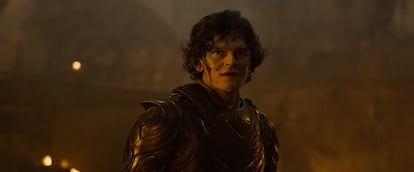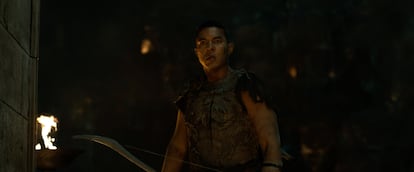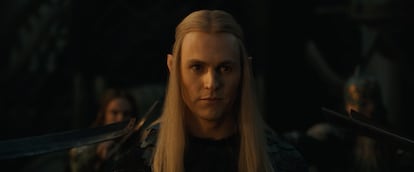‘The Lord of the Rings: The Rings of Power’ according to its actors: ‘It is a story of survival. It will be unpredictable, volatile’
The series’ protagonists talk about what’s new in the second season and the responsibility that lies in bringing Tolkien’s world to life

The inhabitants of Middle Earth are back. On Thursday, Prime Video debuted the second season of The Lord of the Rings: The Rings of Power, one of the streaming platform’s most ferociously awaited offerings of the year. After a first installment that set up the story’s foundations and introduced a myriad of elves, dwarves, harfoots, kings and princesses, the series’ troops are swinging into action. The official trailer for the second season of the series, which is based on the universe of J.R.R. Tolkien, was presented to great anticipation at the end of July in San Diego’s ComicCon, where creators and performers appeared on a panel about the series. A few hours later, 16 of its protagonists sat down to speak with reporters from international media outlets, among them EL PAÍS.
Actors Benjamin Walker (Gil-galad, high king of the Noldor), Morfydd Clark (Galadriel), Charles Edwards (Celebrimbor), Charlie Vickers (Sauron/Halbrand), Lloyd Owen (Elendil), Ema Horvath (Earien), Cynthis Addai-Robinson (Queen Miriel), Maxim Baldry (Isildur), Sophia Nomvete (Princess Disa), Trystan Gravelle (Pharazon), Ismael Cruz Córdova (Arondir), Tyroe Muhafidin (Theo), Daniel Weyman (The Stranger), Megan Richards (Poppy), Robert Strange (Glug) and Sam Hazeldine (Adar) got into the details of the series: its location shift from the universally adored New Zealand to London by way of Tenerife, the evolution of their characters, the complexity of Middle Earth and the importance of good and evil.
Destiny, fear, jealousy and survival are key
In the second season of Lord of the Rings, central themes revolve around the epic. “In my eyes, I think that the two big themes of this return are fear and jealousy,” Ema Horvath (who plays the elf Earien) said, caressing her pregnant belly. Co-Star Lloyd Owen (Elendil) seconds the notion. “Obviously, I think that what drew my attention the most when I re-read the books was that Tolkien and the characters talk about their destiny. There’s this awareness that destiny plays a role in everyone’s life and something unavoidable is pulling you in a certain direction. It’s like Greek [mythology] in that sense. Right? Like, this is what is going to happen. And I think in Lord of the Rings, Elendil is being pulled into a fight. I bet his heart is tugging at him, in his head he might be rational, but in the end, he can’t deny his fate.”
For Owens, “each person in each world has to make a moral decision.” Maxim Baldry (Isildur) thinks of it as “a story of survival, so inevitably it will be unpredictable, volatile and you’ve got to learning quickly how to grow, to be a man.”

For Puerto Rican actor Ismael Cruz Córdova, the only Latino among the core cast, the question of good and evil is also very present. “We’ve all talked behind someone’s back, we’ve all done those things. When you’re playing a role, you have to be able to remember that we are not only virtuous people,” he says. “They are two sides of a coin. The bad in addition to the good, everyone is convinced that they are good guys, that they are pursuing the great, final goal.” Young Tyroe Muhafidin (Theo) reflects on how Tolkien enjoyed “the idea that the human heart is easily corrupted,” and how that theme is present in both the first and second seasons, particularly in his own character who, he says, “has an evil side but a good heart, and being able to play with that conflict, that corruption, is an honor.”
Sauron and Mordor, the construction of evil
Charles Edwards (Celebrimbor) and Charlie Vickers (Sauron/Halbrand) underline the importance of Sauron in this season. Vickers, who plays the character’s both incarnations, says that when it comes to the construction of his character, “everything is intentional, everything should be intentional from Sauron’s perspective. It’s not about being there just to be there, everything in this season is because of Celebrimbor. What he’s like physically, how he speaks and even how he walks. That’s where it all comes from.”
Edwards agrees. “Sauron shows up in an extraordinary way, like an emissary of the Valar. It’s amazing how someone can rise from the flames and show up in that way,” he says. “You’re at least going to hear out what he has to say, it’s like being visited by God.”
Robert Strange (who plays the orc Glug) explains the importance of showing the creation of Mordor and the inhabitants who dwell in the dark land. “For me, one of the most exciting parts of the first season was getting that knowledge about the orcs. Yes, they’re bad.” “Sometimes, misunderstood,” interjects his colleague Sam Hazeldine (Adar). “Exactly. They were displaced people who, in a certain way, just wanted a home. That’s why Adar is their leader, for them, he is their father because he brought them to create a home. It’s going to be exciting to see him develop throughout the season, along with the threat of the appearance of Sauron, which adds another layer of difficulty.”

Diversity in Middle Earth
During the interview, Baldry and Sophia Nomvete (Princess Disa) spoke about what Middle Earth has become throughout the series, and what it will continue to be in the second season: an inclusive and diverse world. “It is a representation of the world we live in, and I think Tolkien always wrote with it in his head, given that there are many cultures and races and worlds in Middle Earth, and it’s important that we represent that visually,” they said.
“I feel honored,” said Nomvete, one of the fans’ favorite actresses. “How can we create Middle Earth. I’ll say it clearly: Tolkien never would have wanted exclusive access to Middle Earth. I don’t believe that. So to be exclusive, we have to be inclusive,” she says.
A matter of chemistry and trust
In an ensemble series, with so many characters of different roles, races and ages, actors emphasized that trust and chemistry was fundamental. Daniel Weyman (The Stranger), seated alongside co-star Megan Richards (Poppy), affirmed that trust is a fundamental issue. “I trust Megan and I think that’s one of the great pleasures of working on this series. One of the greatest joys has been meeting people who you can work with, with whom you can let yourself go. And I know that if I put something on the table, they’ll respond in a real, honest, authentic way, and that is amazing.” “Yes, 100% agree,” said Richards. “It’s really nice to have such an open relationship with people, not just with the actors, but with the crew, the directors, the conversations we have with the camerapeople, they tell us how the shot is looking.”

Vickers mentioned the importance of that quality relationship between him and Edwards. “It may seem strange because yes, you test out on-screen chemistry and that kind of thing, but I think that later on, it’s something that just happens,” he reflected on his connection with Edwards, glancing over at his co-star for confirmation. “We always talk like, ‘Ugh, this is going to be really boring, it’s two guys talking for the majority of the series,’ but seeing it is really exciting. It’s still high fantasy, but you have these microcosms, this world, which is like a psychological thriller, almost like The West Wing.”
A world for elves, harfoots and orcs
In a world of elves, orcs, harfoots and all kinds of creatures, coexistence is far from simple, as is each character’s understanding of the others. This was a recurring subject for the actors on the panel. Benjamin Walker (Gil-galad, high king of the Noldor) said, “part of the challenge of understanding an elf is knowing that they have survived everything, everything they once loved is dead, so how can they reinvest in love? How can you reinvest in Middle Earth knowing how fallible it is? And that is something unique to their group.” “They are the elves who chose to remain in Middle Earth and dedicate their extended lives to this fallible world,” he reflects, “and I think that makes them a redeemable species, even though they can be a bit stoic and distant. The fact that they’re there, and the fact that they’re concerned — they know how bad things can get and they still have hope, and that’s a lot.”
His co-star Morfydd Clark, who plays Galadriel, thinks that having lived for so many years, in his eyes, makes the elves special beings. “It’s really fun to play a character that doesn’t adjust to human social norms, it’s really freeing.” “And I don’t know if this is a spoiler or not,” says Walker, but, “elves are fun! I won’t say anything else,” he continues, laughing.
Clark thinks the hobbits are what make Middle Earth “something really special.” “Because it has to be a world that is safe enough for them to exist. It can’t be just for the elves, just for the orcs, just for the men. And that is something that I think will always bring me back to Tolkien’s world, that hope for a world that can be something more delicate, friendlier, sweeter.”

Robert Strange, just like the orc Glug, thinks that orcs come across better in the series, that they are better developed and can go beyond being merely coarse and evil creatures. “Glug has a story that represents the orcs with greater depth and complexity. They are not just warriors, they also have families, responsibilities, social structures. And we’re going to see how that affects his relationship with Adar, the father of the orcs, in a more ample sense.”
Fire, prosthetics, action!
Hazeldine thinks the characters’ wardrobe and makeup is fundamental to the series. “The prosthetics are incredible. It all really adds up.” Strange agrees, saying, “Many of the members of the crowd that you see, all those orcs, they were really there, wearing prosthetics. It was incredible.” That’s another one of series’ key points, and also the reason for its enormous budget: everything is real. “I thought there would be a ton of blue screens,” says Hazeldine, remembering his expectations of a special-effects-heavy project. “I think I saw two during the entire shoot. The rest was all real, because there were incredible set designers. They’re the best at what they do, with so much attention to detail. I think that this is the sum of its parts, and it’s fantastic.”
“It was incredibly exciting to film, and I think it will be exciting to watch,” says Clark. “It’s incredible to feel how immense it all is where you’re there, and all the skills that are unfurled on set. We have archers, the best stunt doubles, amazing horses. We’re on a giant set that can do things on its own,” he says. “But there’s even a crew that is just in charge of making fire — just fire! They control the fire!” laughs Walker. “It’s a childhood dream come true. It’s what I’ve always wanted to do in the woods and now I’m getting paid for it, it’s great.”

From New Zealand to the United Kingdom, by way of Tenerife
The series’ first season was filmed in New Zealand, as was a good part of the original Lord of the Rings film trilogy. The actors say it was an incredible experience, especially during the height of the Covid-19 pandemic. They felt safe, and were surrounded by such spectacular landscapes, their time there left a mark on them. “New Zealand helped me in a way I never imagined a country could,” said Nomvete. “That’s where the series was born, and also my baby,” she said, with emotion. For Cruz, it was “incredible.” “We had a wonderful chapter, it was a long year and it gave us a home in uncertain times”; so much so that he brought his brother over to be with him during the shooting. “It was all precious,” says Muhafidin. “It made the cast come together in a way that would not have been possible under other circumstances,” says Edwards. “Can I go back to paradise, please?” asks Walker. “It was magical, we miss it.” For the second season, the team made the leap to the United Kingdom, filming in London and its surroundings. “Living in London is also wonderful,” says Cruz. Not to mention, as several cast members emphasized, many of them are Brits — being able to go home at the end of the day is always appreciated.
Cynthia Addai-Robinson recalled how she also filmed the movie Spartacus in New Zealand, and that returning to the country was exciting. But apart from the move to London, she also filmed in an additional location: the Spanish island of Tenerife. “We had a couple stories that we shot on the island, and on some of my favorite days, I was looking at the ocean, the horizon, because there wasn’t a lot of acting required at that point, just feeling what Mother Earth is giving you, she is the best set designer,” she remembered.
Fan involvement
The actors admit to being surprised by and thankful for fans’ reactions. For the most part, the public has accepted the arrival of a new series based on the nearly sacred works of Tolkien. At ComicCon, many fans attended dressed as characters from the series (“I have seen two girls dressed like me,” said Horvath), followed the actors around and asked for autographs. “It’s something I hadn’t realized while making the series, that this many people were going to watch it. And it’s a great feeling, it’s still incredible to me that people from Brazil, from India and Wales say hi and ask me questions, that they feel a connection. It’s an immense honor.” Walker feels the same way: “It’s an experience that humbles you.”
With her role of Princess Disa, Nomvete has amassed her fair share of admirers. “I feel honored,” she says. “Plus, Disa is a new character, we are building out something that Tolkien touched upon, but creating our own version from nothing. The showrunners have been brilliant, they’ve let us collaborate, we’ve been very involved.”
Sign up for our weekly newsletter to get more English-language news coverage from EL PAÍS USA Edition
Tu suscripción se está usando en otro dispositivo
¿Quieres añadir otro usuario a tu suscripción?
Si continúas leyendo en este dispositivo, no se podrá leer en el otro.
FlechaTu suscripción se está usando en otro dispositivo y solo puedes acceder a EL PAÍS desde un dispositivo a la vez.
Si quieres compartir tu cuenta, cambia tu suscripción a la modalidad Premium, así podrás añadir otro usuario. Cada uno accederá con su propia cuenta de email, lo que os permitirá personalizar vuestra experiencia en EL PAÍS.
¿Tienes una suscripción de empresa? Accede aquí para contratar más cuentas.
En el caso de no saber quién está usando tu cuenta, te recomendamos cambiar tu contraseña aquí.
Si decides continuar compartiendo tu cuenta, este mensaje se mostrará en tu dispositivo y en el de la otra persona que está usando tu cuenta de forma indefinida, afectando a tu experiencia de lectura. Puedes consultar aquí los términos y condiciones de la suscripción digital.









































